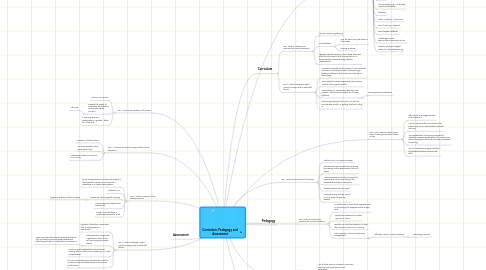
1. Qn 4: What Challenges might come our way? How to deal with them?
1.1. rigorous Alternative Assessment that is recognised as a benchmark
1.2. Internationally recognised Assessment mode that is still by & large pen-paper based
1.2.1. Parent recently called and complained that her son not used to pen and paper assessment after frequent uses of Macbook for assessment
1.3. Convincing all stakeholders to be forward looking and not stick to old modes eg. 'O' level of assessment.
1.4. For LSS, more alternative assessment could be in place. These would decrease as they move up the levels
2. Qn 3: What is missing for this Situation so far?
2.1. try to incorporate more structured questions that resemble Section B and Section C Questions in O Levels exam papers.
2.2. Effective AFL
2.3. Assessment that supports learning
2.3.1. Rigorous Rubrics must be in place
2.4. Components of students self assessment
2.5. Pupils AND staff have a misplaced perception of PE
3. Qn 2: What can be done to improve the current situation?
3.1. creation of viable rubrics
3.2. Set clear guidelines and expectations (PE)
3.3. Assessment Rubrics is not tie in to O Levels
4. Qn 1 What Have we done in this area?
4.1. online MCQ quizes
4.2. Prepare the pupils to undertake the National Testing Standards (NAPFA)
4.2.1. NIke IPE
4.3. e-learning exercise participation is graded - taken as 1 class test
5. Assessment
6. Q3: In your opinion, what do you think is missing from this situation so far?
6.1. ICT is to be used as a means to enhance learning anchored upon sound pedagogy.
6.2. To introduce measures to motivate the participants to last the duration of the project (iPE)
7. Qn 4: What Challenges might come our way? How to deal with them?
7.1. A ability for teacher to monitor their learning.
7.2. Time constraint - participants not able to devote time to the project because of other interests/commitments (iPE)
7.2.1. To structure the duration of the project into the time-table (iPE)
7.3. Development of teacher competencies
7.4. how to direct them to be a self-directed learner?
7.4.1. To create more opportunities for students to be more confident.
7.5. Reluctance of teachers
7.6. Transforming teachers to facilitators
7.7. Constructive learning taking place?
8. Q1: What have we done in this area?
8.1. Ubd-IBL-ICT-FMS lesson package
8.2. Collaborative and Constructive learning by viewing Online Experiments (Chia KP video)
8.3. Viewing experiments such as pendulum experiments online and filling in the worksheets outside of classroom.
8.4. Implementation of iPE Project
8.5. Inquiry learning through use of ICT (i.e. online streaming videos)
9. Q2: What can be done to improve the current situation?
9.1. To implement a more structured approach in monitoring the progress of the project (iPE)
9.2. Appropriate assessment modes - eg. use of rubrics
9.3. Teacher can facilitate students to help them construct their own learning
9.4. More support in terms of classroom management
9.4.1. Effective ARD to monitor learning
9.4.1.1. Retraining required
10. Q3: In your opinion, what do you think is missing from this situation so far?
10.1. difficulty to draw diagrams and write equations
10.2. We can maximise the use of Individual Lesson Plan so its more student directed learning.
10.3. The presentation of learning materials to students is passive (powerpoint etc). Need more interactive aspects like java animation contained in learning.
10.4. We can create more opportunities to let students practice Chinese oral skills
11. Q1: What have we done in this area?
11.1. Forum Discussion
11.1.1. Content analysis of asynchronous discussion forum
11.2. youtube videos harnessed to trigger and enhance student learning
11.3. uploading of podcasts and powerpoint notes online
11.4. Multimedia Worksheets on Studywiz
11.5. Advertisement
11.5.1. EL
11.5.2. Ch
11.6. Online dictionary
11.7. Use of online Math portal
11.7.1. HeyMath
11.7.2. AceLearning
11.8. Delivering Speeches
11.9. Blogger
11.10. Mind-mapping e.g. Mindnodes, c-map, Mindmeister
11.11. Studywiz
11.12. Flash Animation - Xtranormal
11.13. Use of Wiki e.g. Wetpaint
11.14. Use of digital textbook
11.15. Knowledge Forum - asynchronous discussion forum
11.16. Creation of physics digital videos for internet streaming
12. Curriculum
12.1. Q2: What can be done to improve the current situation?
12.1.1. AED for resource-gathering
12.1.2. Consolidation
12.1.2.1. Can the same thing be done in other dep?
12.1.2.2. Sharing & review
12.1.3. Teachers need to spend MUCH MORE time and effort to plan lessons that incorporate ICT in lessons without compromising syllabus requirements
12.2. Qn 4: What Challenges might come our way? How to deal with them?
12.2.1. We must anticipate the oncoming of School Based Curriculum and explore how to close the gap between syllabus and the relevant enabling ICT technology
12.2.2. Some subjects require paper-and pen practice. How to ensure good results?
12.2.3. Conducting ICT lessons may take up more periods - how to find enough time to finish syllabus?
12.2.3.1. Learning beyond classroom
12.2.4. Convincing teachers that use of ICT will not compromise results i.e. getting teachers to buy in
